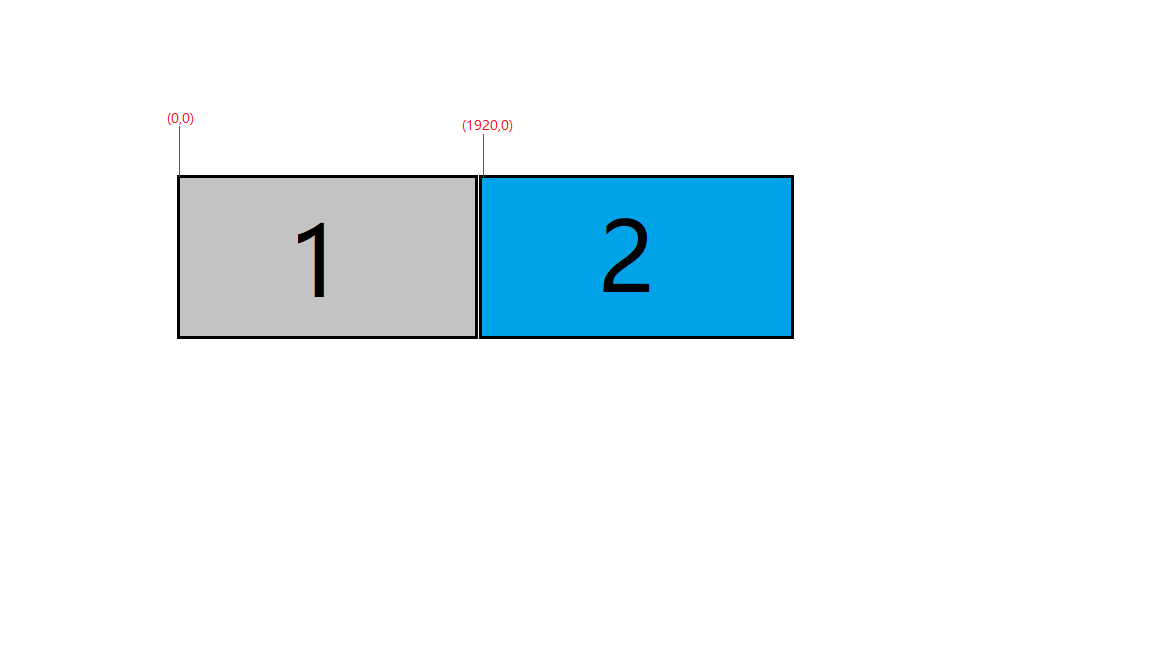Windows 窗体的自适应分辨率、分屏显示、开机自启动
前言
这里所说的针对Winform、WPF 都适用。开机自启动对于控制台的也可以。
还是从项目实践中得来的,在这里记录下来。
对于自适应、分屏显示,在以前感觉应该比较高大上的问题,会比较难。在经过这次的实践感觉挺简单的。不过其中还是有一点要根据实际的业务有一些复杂。
一、自适应分辨率
在屏幕的分辨率改变的时候,改变窗口的大小为当前的分辨率,进行适应。这里是要在 “Window_SizeChanged” 事件里面处理。
具体代码:
private void Window_SizeChanged(object sender, SizeChangedEventArgs e) { this.WindowState = WindowState.Normal; this.WindowStyle = WindowStyle.None; this.ResizeMode = ResizeMode.NoResize; if (screenIndex == 0) { this.Left = 0; this.Top = 0; Width = Screen.AllScreens[0].Bounds.Width; Height = Screen.AllScreens[0].Bounds.Height; } else { int leftPix = 0; for (int i = screenIndex - 1; i >= 0; i--) { leftPix += Screen.AllScreens[i].Bounds.Width; } this.Left = leftPix; this.Top = 0; Width = Screen.AllScreens[screenIndex].Bounds.Width; Height = Screen.AllScreens[screenIndex].Bounds.Height; } }
这个代码里面有分屏显示的一部分。
二、分屏显示
项目中需要一台主机输出到多个屏幕,在对应屏幕显示窗口。
在这里要注意,屏幕的排列顺序。这个顺序是“显示”设置界面设置的顺序,不是物理的顺序。
例如:对于两个屏幕,物理上可以一个在上一个在下,但是在“显示”设置界面,可以设置为左右的。
对于左右顺序:每一个屏幕的宽、高还是屏幕的宽高,只是其起始位置坐标不一样。第一个左上角:(0,0),第二个左上角(width1,0)【这里的 width1 是平屏幕1的宽】,后面以此类推。
对于上下顺序:每一个屏幕的宽、高还是屏幕的宽高,只是其起始位置坐标不一样。第一个左上角:(0,0),第二个左上角(0,height1)【这里的 height1是平屏幕1的高】,后面以此类推。
下面的是一个示例图:

知道了屏幕对应坐标的变化就可以上代码:
void MainWindow_Loaded(object sender, RoutedEventArgs e) { this.WindowState = WindowState.Normal; this.WindowStyle = WindowStyle.None; this.ResizeMode = ResizeMode.NoResize; string appName = "Client"; int appCount = Process.GetProcessesByName(appName).ToList().Count; int screenCount = Screen.AllScreens.Count(); if (appCount > screenCount) { this.Close(); } else if (appCount == 1) { this.Left = 0; this.Top = 0; Width = Screen.AllScreens[0].Bounds.Width; Height = Screen.AllScreens[0].Bounds.Height; } else { int leftPix = 0; for (int i = appCount - 2; i >= 0; i--) { leftPix += Screen.AllScreens[i].Bounds.Width; } this.Left = leftPix; this.Top = 0; Width = Screen.AllScreens[appCount - 1].Bounds.Width; Height = Screen.AllScreens[appCount - 1].Bounds.Height; } this.screenIndex = appCount - 1; InitPlay(); }
上面的代码就是根据当前程序的个数,来分配屏幕。开了多个程序,感觉这样方式还不够好,应该一个程序进行分配。
三、开机自启动
开机自启动有几个方式:
1、在开机启动文件夹里面加入要开机启动的快捷方式即可;
2、修改注册表,添加要启动的程序到注册表;
这里用的是第二种方法。
public static void AutoStart(bool isAuto) { try { if (isAuto == true) { RegistryKey R_local = Registry.LocalMachine; //RegistryKey R_local = Registry.CurrentUser; RegistryKey R_run = R_local.CreateSubKey(@"SOFTWARE\Microsoft\Windows\CurrentVersion\Run"); R_run.SetValue("应用名称", "程序地址/Client.exe"); R_run.Close(); R_local.Close(); } else { RegistryKey R_local = Registry.LocalMachine;//RegistryKey R_local = Registry.CurrentUser; RegistryKey R_run = R_local.CreateSubKey(@"SOFTWARE\Microsoft\Windows\CurrentVersion\Run"); R_run.DeleteValue("应用名称", false); R_run.Close(); R_local.Close(); } //GlobalVariant.Instance.UserConfig.AutoStart = isAuto; } catch (Exception) { System.Windows.MessageBox.Show("您需要管理员权限修改", "提示"); } }




【推荐】国内首个AI IDE,深度理解中文开发场景,立即下载体验Trae
【推荐】编程新体验,更懂你的AI,立即体验豆包MarsCode编程助手
【推荐】抖音旗下AI助手豆包,你的智能百科全书,全免费不限次数
【推荐】轻量又高性能的 SSH 工具 IShell:AI 加持,快人一步
· go语言实现终端里的倒计时
· 如何编写易于单元测试的代码
· 10年+ .NET Coder 心语,封装的思维:从隐藏、稳定开始理解其本质意义
· .NET Core 中如何实现缓存的预热?
· 从 HTTP 原因短语缺失研究 HTTP/2 和 HTTP/3 的设计差异
· 周边上新:园子的第一款马克杯温暖上架
· 分享 3 个 .NET 开源的文件压缩处理库,助力快速实现文件压缩解压功能!
· Ollama——大语言模型本地部署的极速利器
· DeepSeek如何颠覆传统软件测试?测试工程师会被淘汰吗?
· 使用C#创建一个MCP客户端